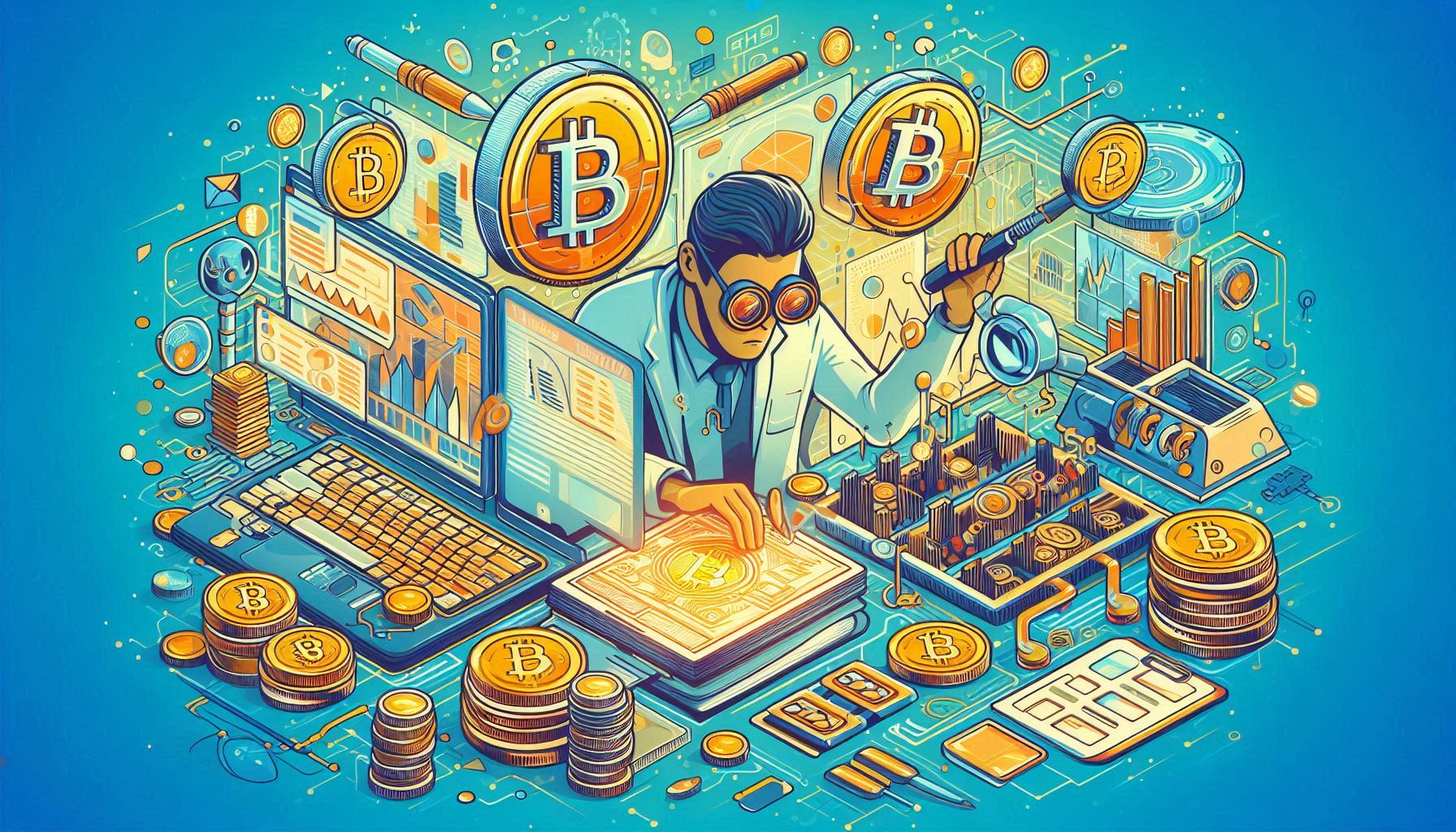Avoid These Scams While Choosing a Crypto Exchange For Investments
Choosing a crypto exchange can be challenging, especially with many scams lurking around. It’s important to be aware of the signs of fake exchanges and poor security practices. This guide will help you recognize potential scams and make safer choices when investing in cryptocurrencies.
Key Takeaways
- Always check if the exchange is regulated by a trusted authority.
- Look for clear information about the exchange’s team and location.
- Be cautious of exchanges that promise guaranteed high returns.
- Ensure the exchange has strong security measures like two-factor authentication.
- Research reviews and feedback from other users before investing.
Recognizing Fake Crypto Exchanges
Identifying fake crypto exchanges is crucial for protecting your investments. These platforms often use deceptive tactics to lure unsuspecting users. Here are some common scams to watch out for:
Pig Butchering Scams
- Scammers may use fake exchanges to control your wallet and assets.
- They often trick victims into providing bank account details to steal funds.
- Be cautious of unsolicited investment offers that seem too good to be true.
Fake Crypto Wallets
- Some fake exchanges promote wallets that are actually traps.
- These wallets can give scammers access to your funds.
- Always verify the legitimacy of any wallet before using it.
Crypto Investment Scams
- Fake exchanges may promote other fraudulent projects.
- They can lead you to invest in non-existent coins or schemes.
- Research any investment opportunity thoroughly before committing.
Rug Pull Scams
- Scammers may promote new coins or investment opportunities.
- Once they gather enough investors, they disappear with the funds.
- Always be skeptical of new projects without a solid track record.
Remember, if an exchange seems suspicious, it’s better to be safe than sorry. Always do your research before investing your money!
Identifying Poor Security Measures
When choosing a crypto exchange, it’s crucial to ensure that it has strong security measures in place. Here are some key areas to consider:
Lack of Encryption Protocols
- Encryption is essential for protecting your data. If an exchange does not use encryption, your personal information could be at risk.
- Look for exchanges that use SSL (Secure Socket Layer) to secure your data during transactions.
- Always check if the exchange has a privacy policy that explains how your data is protected.
Absence of Two-Factor Authentication
- Two-factor authentication (2FA) adds an extra layer of security. Without it, your account is more vulnerable to hacking.
- Ensure the exchange offers 2FA options, such as SMS codes or authentication apps.
- Never use an exchange that does not provide this feature, as it significantly increases your risk.
No Cold Storage for Funds
- Cold storage means keeping funds offline, which is safer from hackers. If an exchange does not use cold storage, your assets may be at risk.
- Check if the exchange has a policy on how they store funds and whether they use cold wallets for the majority of their assets.
- A good exchange should also have a backup plan in case of a security breach.
Always prioritize security when selecting a crypto exchange. Your investments depend on it!
Spotting Lack of Transparency
Hidden Team Information
When choosing a crypto exchange, it’s crucial to know who is behind the platform. If you can’t find information about the team, it could be a red flag. Legitimate exchanges usually provide details about their founders and developers. If this information is missing, consider it a warning sign.
No Clear Company Location
A trustworthy exchange will clearly state its physical location. If an exchange does not provide a company address or claims to be based in a country with loose regulations, it’s best to be cautious. Always verify the location to ensure it’s legitimate.
Opaque Fund Storage Practices
Understanding how an exchange stores user funds is essential. If an exchange is vague about its fund storage methods, it may not be secure. Look for exchanges that use cold storage for the majority of their funds, as this is a safer option against hacks.
Transparency is key when selecting a crypto exchange. Always do your research to ensure you are dealing with a legitimate platform.
Detecting Fake Volume and Trading Activity
Artificially Inflated Trading Volume
Fake crypto exchanges often create a false sense of popularity by artificially inflating their trading volume. This is done to attract unsuspecting investors who might think the exchange is legitimate due to its high activity levels. Be cautious of exchanges that show unusually high trading volumes, especially if they are lesser-known.
Smurf Accounts
Another tactic used by scammers is the creation of smurf accounts. These are multiple accounts controlled by the same person or group, used to execute fake trades. This can make it look like there is a lot of trading activity when, in reality, it’s just the same group of people trading among themselves. Always verify the authenticity of trading activity before investing.
Unusual Trading Patterns
Look out for unusual trading patterns that don’t make sense. For example, if you see sudden spikes in trading volume without any news or events to justify it, this could be a red flag. Legitimate exchanges usually have consistent trading patterns that correlate with market trends.
Always do your homework before investing in any crypto exchange. If something feels off, it probably is.
| Indicator | Red Flag |
|---|---|
| Trading Volume | Unusually high for a new exchange |
| Account Activity | Multiple trades from the same IP |
| Price Fluctuations | Sudden spikes without news |
Avoiding Unrealistic Promises and Offers
When choosing a crypto exchange, it’s crucial to be cautious of unrealistic offers. Scammers often lure victims with deals that seem too good to be true. Here are some common red flags to watch out for:
Guaranteed High Returns
- If an exchange promises guaranteed returns, be skeptical. No investment can assure profits, as the market can fluctuate.
- Always remember: if it sounds too good to be true, it probably is.
Extremely Low Trading Fees
- While low fees are attractive, excessively low trading fees can indicate a scam. Legitimate exchanges have standard fee structures.
- Compare fees across multiple platforms to ensure they are reasonable.
Exclusive Deals for New Users
- Be wary of offers that seem exclusive or limited-time. Scammers often create urgency to pressure you into making quick decisions.
- Take your time to research and verify the exchange before committing.
| Warning Signs | Description |
|---|---|
| Promises of guaranteed returns | No investment can guarantee profits. |
| Unusually low fees | Compare with other exchanges for legitimacy. |
| Pressure tactics | Scammers create urgency to rush your decision. |
Always conduct thorough research before investing in any crypto exchange. Protecting your funds should be your top priority!
Ensuring Regulatory Compliance
When choosing a crypto exchange, regulatory compliance is crucial. It helps ensure that the exchange operates legally and protects your investments. Here are some key points to consider:
Checking for Regulatory Licenses
- Look for exchanges that are regulated by reputable authorities. This means they follow laws that help prevent fraud and protect users.
- Check the exchange’s website for information about their licenses and registrations.
- Make sure they comply with Anti-Money Laundering (AML) regulations.
Verifying AML Compliance
- Ensure the exchange has measures in place to detect and prevent money laundering.
- Look for clear policies on how they handle suspicious activities.
- A compliant exchange will have a transparent process for reporting any illegal activities.
Absence of KYC Protocols
- Know Your Customer (KYC) protocols are important for verifying user identities. If an exchange does not have KYC measures, it may be a red flag.
- A legitimate exchange will ask for identification and other personal information to ensure safety.
- Avoid exchanges that do not prioritize user verification, as they may be involved in illegal activities.
Regulatory compliance is not just a formality; it is a vital part of ensuring your investments are safe and secure. Always do your homework before investing in any exchange.
Evaluating Customer Support
When choosing a crypto exchange, customer support is crucial. You want to ensure that help is available when you need it. Here are some key aspects to consider:
Response Time
- Check how quickly the exchange responds to inquiries. A good exchange should reply within a few hours.
- Look for exchanges that offer 24/7 support, especially if you trade at different times.
- Test their response time by sending a question before you start trading.
Support Channels
- Ensure the exchange provides multiple ways to reach them, such as:
- Live chat
- Phone support
- Having various options can make it easier to get help when needed.
Quality of Assistance
- Evaluate the helpfulness of the support team. Ask questions to see if they:
- Provide clear and accurate answers
- Are friendly and professional
- Follow up on unresolved issues
Remember, a reliable exchange will prioritize customer support. If you encounter slow responses or unhelpful staff, it might be a sign to look elsewhere.
Final Thoughts on Choosing a Crypto Exchange
In conclusion, being careful when selecting a crypto exchange is essential to avoid scams. Always check if the exchange is regulated and has strong security measures in place. Look out for unrealistic promises and do your research by reading reviews and engaging with the crypto community. Remember, if something seems too good to be true, it probably is. By staying informed and cautious, you can protect your investments and enjoy the benefits of cryptocurrency without falling victim to fraud.
Frequently Asked Questions
What are fake crypto exchanges?
Fake crypto exchanges look like real trading platforms but are actually scams that try to steal your money or personal information.
How can I recognize a scam exchange?
You can spot a scam exchange by checking for poor security, lack of transparency, and unrealistic promises.
What should I look for in a legit crypto exchange?
A legitimate exchange should have strong security measures, clear information about its team, and regulatory compliance.
Are there any common scams I should be aware of?
Yes, common scams include pig butchering scams, fake wallets, and rug pulls that trick people into losing their money.
How can I protect my investments from scams?
To protect yourself, research exchanges, never share your private keys, and be cautious of offers that seem too good to be true.
What should I do if I suspect a scam?
If you suspect a scam, report it to the authorities and avoid engaging with the suspicious exchange.
Stay informed with daily updates from Blockchain Magazine on Google News. Click here to follow us and mark as favorite: [Blockchain Magazine on Google News].
Get Blockchain Insights In Inbox
Stay ahead of the curve with expert analysis and market updates.
latest from tech
Disclaimer: Any post shared by a third-party agency are sponsored and Blockchain Magazine has no views on any such posts. The views and opinions expressed in this post are those of the clients and do not necessarily reflect the official policy or position of Blockchain Magazine. The information provided in this post is for informational purposes only and should not be considered as financial, investment, or professional advice. Blockchain Magazine does not endorse or promote any specific products, services, or companies mentioned in this posts. Readers are encouraged to conduct their own research and consult with a qualified professional before making any financial decisions. The featured image used is just a creative depiction of the title and it does not intend to hurt sentiments of any person or institution. If it hurts anyone sentiments, please do not hesitate to reach out to Blockchain Magazine.

 Bitcoin
Bitcoin  Ethereum
Ethereum  XRP
XRP  Tether
Tether  Solana
Solana  USDC
USDC  Dogecoin
Dogecoin  Cardano
Cardano  Lido Staked Ether
Lido Staked Ether  TRON
TRON  Wrapped Bitcoin
Wrapped Bitcoin  Wrapped stETH
Wrapped stETH  Chainlink
Chainlink  Avalanche
Avalanche  Sui
Sui  Stellar
Stellar  Litecoin
Litecoin  Toncoin
Toncoin  Shiba Inu
Shiba Inu  LEO Token
LEO Token  Hedera
Hedera  MANTRA
MANTRA  USDS
USDS  Hyperliquid
Hyperliquid  WETH
WETH  Polkadot
Polkadot  Bitcoin Cash
Bitcoin Cash  Bitget Token
Bitget Token  Ethena USDe
Ethena USDe  Wrapped eETH
Wrapped eETH  Uniswap
Uniswap  Monero
Monero  NEAR Protocol
NEAR Protocol  Pepe
Pepe  WhiteBIT Coin
WhiteBIT Coin  Aave
Aave  Bittensor
Bittensor  Ondo
Ondo  Aptos
Aptos  Internet Computer
Internet Computer  Dai
Dai  Official Trump
Official Trump  Ethereum Classic
Ethereum Classic  Mantle
Mantle  Tokenize Xchange
Tokenize Xchange  OKB
OKB  Gate
Gate  sUSDS
sUSDS  Coinbase Wrapped BTC
Coinbase Wrapped BTC 




